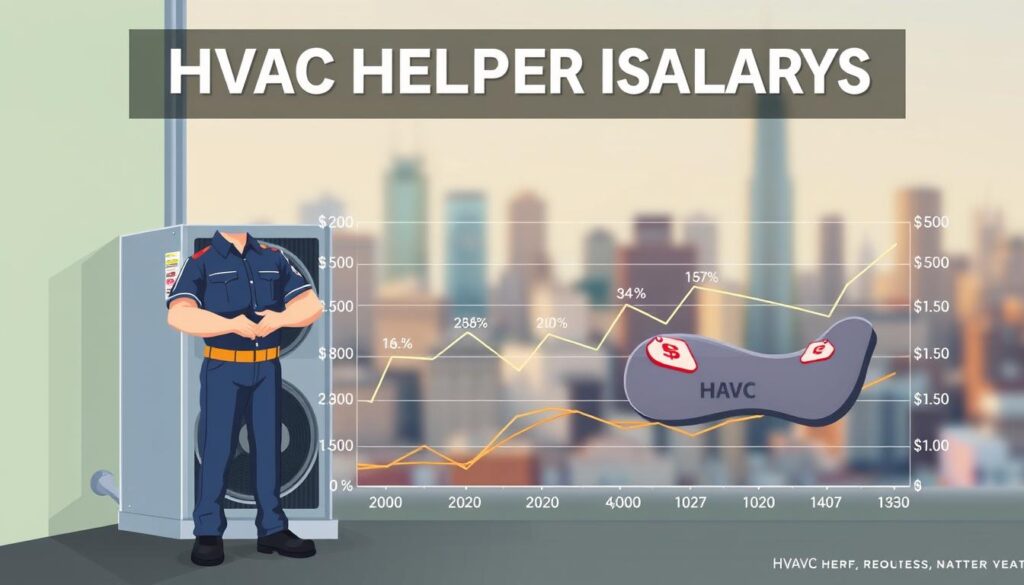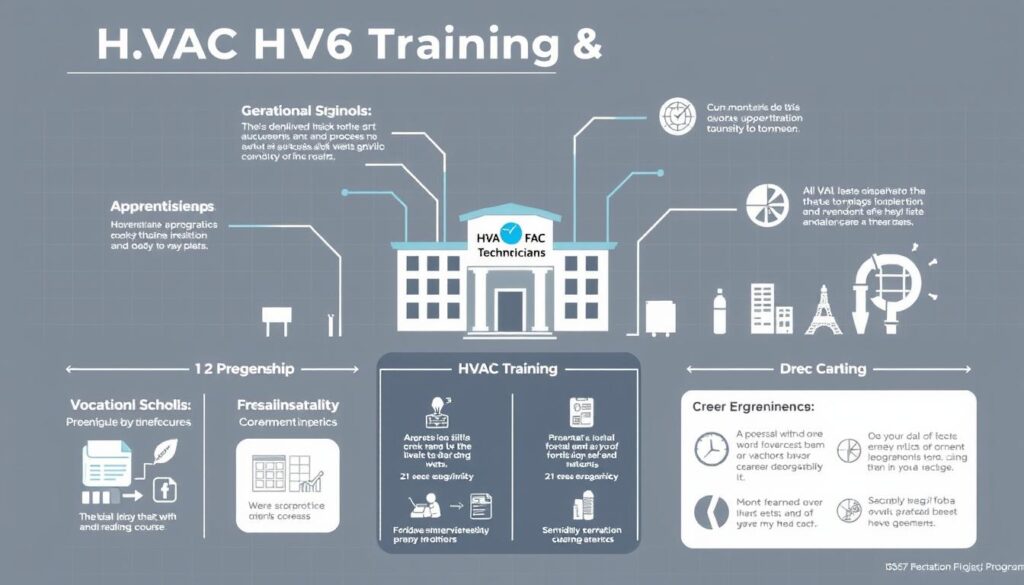Affiliate Disclosure
HVAC Guide Guys is a participant in the Amazon Services LLC Associates Program, an affiliate advertising program designed to provide a means for sites to earn advertising fees by advertising and linking to Amazon.
How Much Do HVAC Helpers Make? Are you thinking about a career as an HVAC helper? This field is full of chances for those who want to learn a trade. It’s a stable and rewarding job.

The Bureau of Labor Statistics says HVAC helpers start at about $37,000 a year. This might make you curious about the income in this field. Knowing how much HVAC helpers make can help you decide if it’s right for you.
The salary for HVAC helpers is more than just a number. It can grow as you get more experience and skills. If you’re looking for a good career or want to change jobs, learning about HVAC helper salaries is a great start.
Key Takeaways
- Entry-level HVAC helpers can expect an average starting salary of $37,000
- Salary increases with experience and specialized skills
- HVAC helper roles offer stable career opportunities
- Geographic location impacts overall earning
- Additional certifications can boost income significantly
Table of Contents
Understanding the Role of HVAC Helpers
HVAC helpers are key in the heating, ventilation, and air conditioning field. They help keep and set up complex systems in homes and businesses.
The pay for HVAC helpers shows how vital they are to the team. They need strength, technical skills, and a desire to learn every day.
Basic Job Responsibilities
HVAC helpers do important tasks for licensed techs:
- Carrying and moving heavy tools
- Getting job sites ready for work
- Cleaning and keeping work areas tidy
- Helping with system setups
- Using tools and basic tech gear
Required Skills and Qualifications
To be good at their job, HVAC helpers need certain skills:
- Being physically fit for lifting
- Understanding basic mechanics
- Being good at talking and listening
- Following safety rules
- Being eager to learn new tech skills
Work Environment and Conditions
HVAC helpers work in many places, from small attics to big buildings. They need to be physically strong, comfortable in different temperatures, and ready for tough conditions.
They face challenges like working in tight spots, handling heavy tools, and adjusting to different work places.
National Average Salary for HVAC Helpers
Thinking about becoming an HVAC helper? Knowing how much you can earn is key. The average salary for HVAC helpers is promising. Your earnings can change based on a few important things.
HVAC trainee income usually falls between $46,000 and $68,000 a year. The average yearly pay is about $50,590. This is a good starting point for those in this trade. Beginners earn less, while more seasoned helpers make more.
- Entry-level HVAC helpers: $35,000 – $45,000 per year
- Mid-range HVAC helpers: $46,000 – $55,000 per year
- Experienced HVAC helpers: $56,000 – $68,000 per year
Your actual pay depends on several things, including:
| Salary Influencing Factors | Potential Impact |
|---|---|
| Geographic Location | ±15% of base salary |
| Work Experience | Up to 25% increase |
| Specialized Skills | Additional 10-20% compensation |
Pro tip: To increase your earnings, keep learning and improving your skills. Getting certifications and specialized training can really help your income in the HVAC field.
Explore Our HVAC Shop
Looking for top-rated HVAC tools, parts, and accessories? Visit our shop and find the perfect solution for your needs.
Visit the ShopFactors Affecting HVAC Helper Wages
Understanding how much HVAC assistants get paid can help you plan your career. Many things affect how much HVAC workers earn. It’s important to know what these are.
Your pay as an HVAC worker isn’t just one thing. It’s a mix of several factors. Let’s look at the main things that can change how much you earn.
Geographic Location Variations
Where you work is a big factor in your pay. Some places pay more because of:
- Local cost of living
- How much HVAC services are needed
- The economic state of the area
Places like Alaska, Massachusetts, and New Jersey pay HVAC helpers well.
Experience Level Impact
Your career path affects how much you can earn. HVAC helpers see their pay grow as they:
- Start with basic jobs and rates
- Get pay raises as they learn more
- Get advanced certifications and training
Company Size and Type Considerations
The company you work for also matters a lot. Bigger companies and certain types of work often offer:
- Higher base salaries
- Better benefits
- More chances to move up
Working in residential or commercial HVAC can have different pay levels. Commercial work usually pays more because it’s more complex and requires more skills.
How Much Do HVAC Helpers Make in Different States
Your salary as an HVAC helper can change a lot based on where you work. The place you choose to work greatly affects how much you can earn in the HVAC field.
Places with a big need for HVAC services usually pay more. Alaska is one of the highest-paying states, with HVAC workers making about $75,660 a year. On the other hand, Florida pays less, with HVAC workers earning around $46,940 a year.
- Top-paying states for HVAC helpers:
- Alaska: $75,660 average annual salary
- Washington: $68,300 average annual salary
- Massachusetts: $65,890 average annual salary
- States with lower HVAC helper salaries:
- Florida: $46,940 average annual salary
- Mississippi: $48,230 average annual salary
- Arkansas: $49,520 average annual salary
Many things affect how much you can earn in different places. These include:
- Cost of living in each state
- Local HVAC service demand
- Regional economic conditions
- Population density
Before starting your HVAC career, look into the salary ranges in your desired state. Places that pay more might offer better chances for career growth and financial security.
Explore Our HVAC Shop
Looking for top-rated HVAC tools, parts, and accessories? Visit our shop and find the perfect solution for your needs.
Visit the ShopCareer Progression and Salary Growth
Your journey as an HVAC helper can lead to exciting opportunities. You’ll start with entry-level HVAC technician helper wages. Then, you can advance your career and increase your earnings.
HVAC professionals follow a structured career path. This path transforms initial earnings into substantial long-term income. It requires dedication, continuous learning, and strategic skill development.
From Helper to Certified Technician
To move from an HVAC helper to a certified technician, focus on several areas:
- Complete vocational training programs
- Obtain required certifications
- Gain hands-on experience under experienced technicians
- Pass state licensing examinations
Timeline for Advancement
Your career advancement typically follows this progression:
- 0-2 years: HVAC helper with basic skills
- 2-4 years: Junior technician with specialized training
- 4-6 years: Certified technician with expanded responsibilities
- 6+ years: Senior technician or management roles
Potential Earnings Growth
As you progress, your earnings can significantly increase. Skilled technicians often see substantial salary jumps with additional certifications and expertise.
Professional growth in HVAC isn’t just about money—it’s about mastering a critical trade that keeps communities comfortable and functional.
Education and Training Requirements

To become an HVAC helper, you need to plan your education carefully. Your journey to earning as an HVAC apprentice starts with knowing the different training paths. Most people start with structured programs that teach the basics.
There are several ways to train for HVAC helper roles:
- Vocational school programs (6-12 months)
- Community college technical certificates
- Apprenticeship programs
- Employer-sponsored training initiatives
The time it takes to prepare for hvac trainee income varies. Vocational programs last from 6 to 12 months. They give you technical knowledge and practical experience. Community colleges offer two-year associate degree programs that can open more doors in your career.
| Training Path | Duration | Average Cost | Certification Possible |
|---|---|---|---|
| Vocational Program | 6-12 months | $5,000-$15,000 | HVAC Technical Certificate |
| Apprenticeship | 3-5 years | Minimal/Paid Training | Journeyman HVAC Technician |
| Community College | 2 years | $10,000-$30,000 | Associate’s Degree + Certification |
Certifications can really help you earn more. The Environmental Protection Agency (EPA) Section 608 Certification is key for working with refrigerants. Specialized certifications from HVAC Excellence can also set you apart in the job market.
It’s important to keep learning in this fast-changing field. New technologies come out all the time. Staying up-to-date with these changes is vital for keeping your hvac apprentice earnings high.
Explore Our HVAC Shop
Looking for top-rated HVAC tools, parts, and accessories? Visit our shop and find the perfect solution for your needs.
Visit the ShopBenefits and Additional Compensation
HVAC assistant jobs offer more than just an hourly wage. Knowing all the benefits helps you see the true value of HVAC jobs.
When looking at hvac worker pay, consider the whole package. Many employers give great benefits that increase your earnings.
Health Insurance and Retirement Plans
Top HVAC employers give amazing benefits. These include:
- Medical, dental, and vision insurance
- 401(k) retirement savings plans
- Life and disability insurance
- Flexible spending accounts
Overtime Opportunities
HVAC helpers can earn more with overtime. Peak seasons and emergencies offer extra chances to make money. Typical overtime rates are 1.5 to 2 times your regular hourly rate.
Performance Bonuses
Many HVAC companies reward great work with bonuses:
- Safety performance bonuses
- Customer satisfaction rewards
- Referral bonuses
- Annual performance incentives
Your total earnings as an HVAC helper can be much higher with these benefits and chances to earn more. Always talk about and understand your full compensation package.
Comparing HVAC Helper Salaries to Other Trade Positions

Exploring trade careers? Knowing how hvac helper salaries stack up against others is key. The trades offer good pay, with each field having its own earning levels.
Let’s look at how hvac labor pay rates compare across different trades:
- Electrical Workers: Starting salaries range from $35,000 to $50,000 annually
- Plumbers: Entry-level positions typically earn $40,000 to $55,000 per year
- HVAC Helpers: Average starting wages between $30,000 and $45,000
- Construction Laborers: Initial earnings around $32,000 to $42,000
Salaries vary based on skill needs and industry demand. HVAC helpers can grow into better-paying roles. Your career path greatly affects your earnings over time.
Several factors affect trade salaries:
- Geographic location
- Certification levels
- Specialized skills
- Years of experience
Even though hvac helper salaries might start lower, the HVAC field offers great career growth. With more training and certifications, you can boost your earnings quickly.
Explore Our HVAC Shop
Looking for top-rated HVAC tools, parts, and accessories? Visit our shop and find the perfect solution for your needs.
Visit the ShopJob Market Outlook and Demand
The HVAC industry is growing fast, opening up great opportunities for those looking into hvac assistant pay and technician helper wages. Experts say the future looks bright for HVAC workers.
The U.S. Bureau of Labor Statistics predicts a 9% employment growth for HVAC technicians from 2023 to 2033. This is much faster than the average for all jobs. It means about 40,100 new jobs will open up every year.
- Emerging technologies are driving demand for skilled HVAC helpers
- Green energy initiatives are creating new job opportunities
- Aging infrastructure requires continuous maintenance and replacement
Several factors are pushing the job market forward:
| Growth Driver | Impact on HVAC Technician Helper Wages |
|---|---|
| Residential Construction | Increased demand for installation services |
| Commercial Building Expansion | More complex HVAC systems needed |
| Energy Efficiency Regulations | Higher demand for skilled technicians |
Your future as an HVAC helper looks promising. With the right training and hard work, you can take advantage of these growing job markets. You might even see your hvac assistant pay increase over the next decade.
Conclusion
Looking into how much HVAC helpers make shows a promising career with good starting pay. The HVAC field offers a dynamic path for those seeking stable jobs and growth chances. Your first-year earnings could be between $28,000 to $38,000 a year, with plenty of room to grow as you gain experience.
To start your HVAC career, you need a solid plan. Invest in technical training, get certifications, and gain hands-on experience. This will help you earn more as an HVAC helper. Growing your skills is essential to increase your value in the market and open up more career doors.
The future is bright for HVAC experts. With new technology and growing infrastructure needs, skilled technicians are always in demand. Whether you want to work for a big company or start your own HVAC business, this career offers good pay, flexibility, and chances for growth.
Your success in HVAC depends on learning, being skilled, and striving for excellence. By understanding the pay and improving your skills, you can create a fulfilling career. This career will bring you financial stability and job satisfaction.

